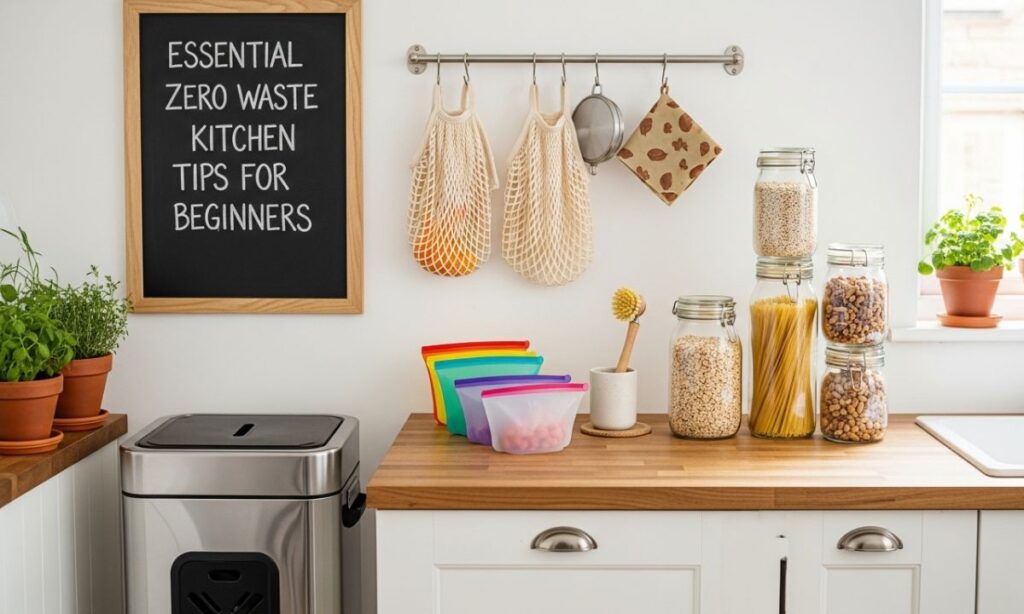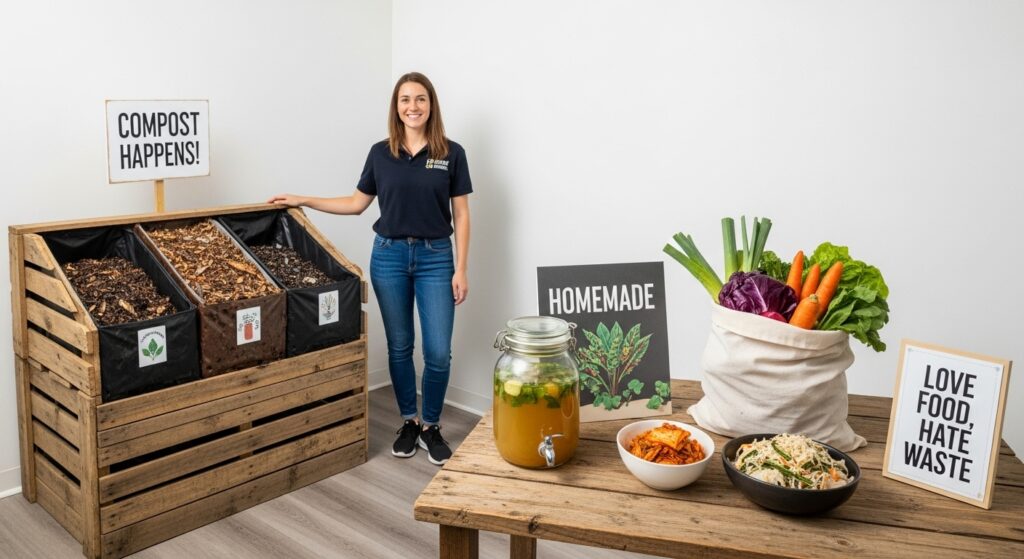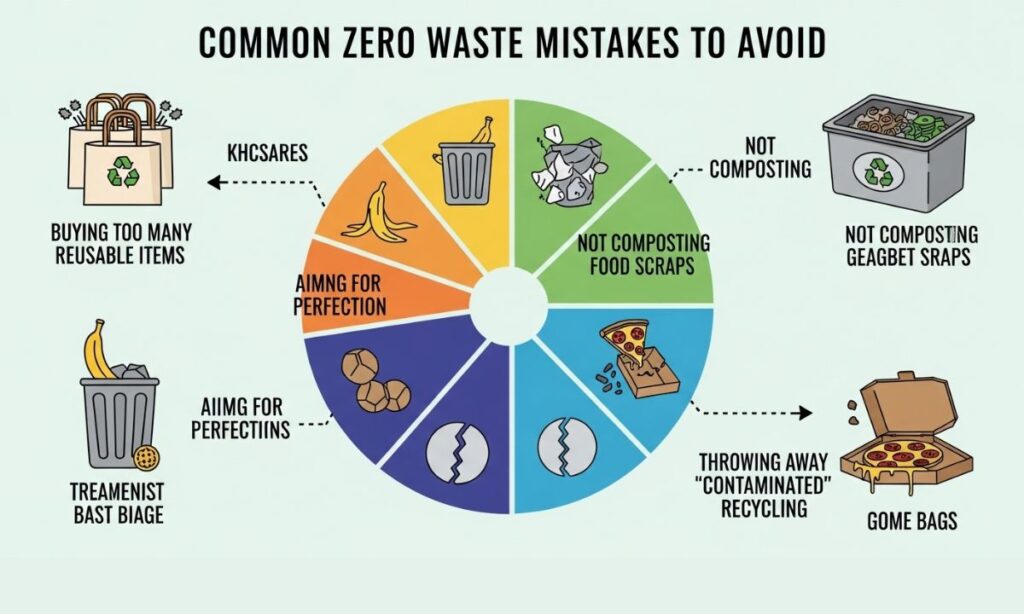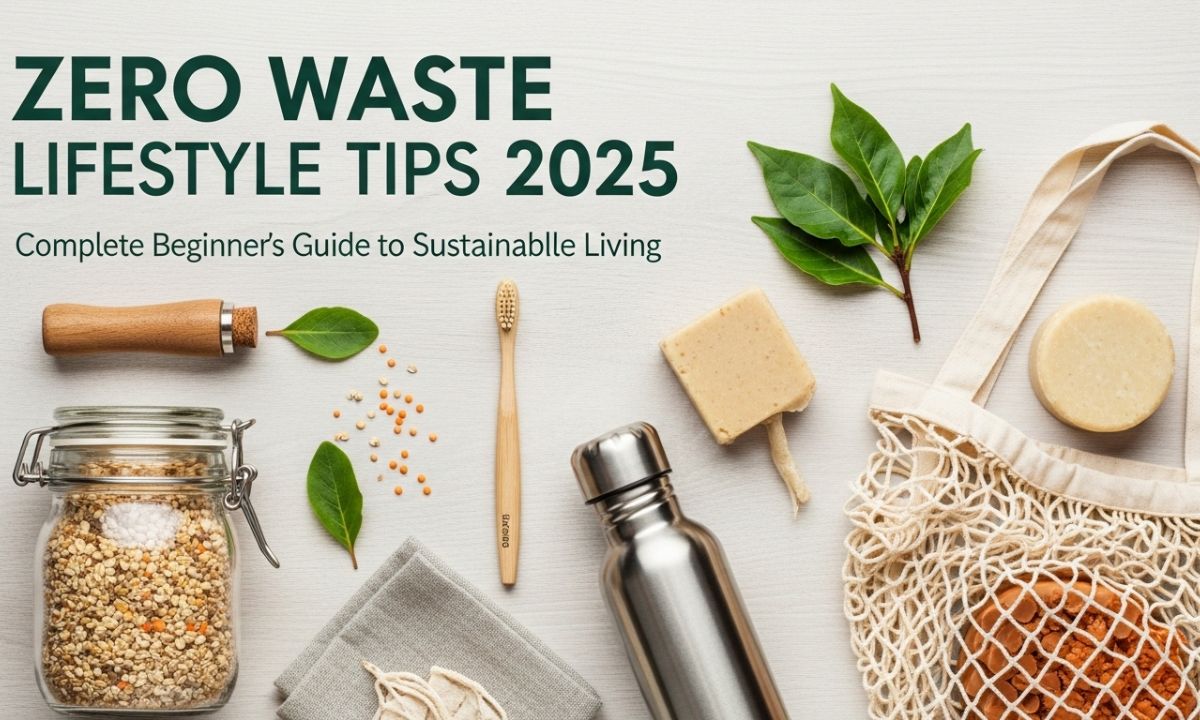Living a zero waste lifestyle has become essential in 2025. Growing environmental concerns and rising costs push people toward sustainable living practices.
These practices benefit your wallet and the planet. Small changes make big differences over time.
Zero waste for beginners is surprisingly flexible. You don’t need dramatic overnight changes.
Small sustainable lifestyle changes create lasting impact. Start with one area and expand gradually.
Environmental sustainability motivates many people. Others focus on saving money through eco-conscious living.
What is Zero Waste Lifestyle and Why Start in 2025?
A zero waste lifestyle means producing minimal waste possible. Follow the reduce reuse recycle principles daily.
The goal isn’t perfection. Focus on making eco-conscious consumer choices instead.
Minimize your environmental impact reduction through smart decisions. Practice sustainable consumption rather than eliminating all waste.
2025 offers perfect timing for your green lifestyle transformation. New eco-friendly alternatives appear regularly in stores.
Plastic-free living becomes easier each year. The circular economy concept gains support from businesses.
More companies offer sustainable home practices now. Biodegradable materials replace traditional options everywhere.
Zero waste lifestyle benefits extend beyond environmental protection. People discover significant cost savings quickly.
Many experience improved health outcomes. A minimalist approach creates cleaner living spaces.
These changes reduce your carbon footprint reduction effectively. Your home becomes more organized too.
READ THIS BLOG : Cryptocurrency Legality by Country 2025
Essential Zero Waste Kitchen Tips for Beginners
Your kitchen provides the best starting point for waste reduction methods. Store food in glass containers instead of plastic bags.
This simple switch reduces packaging waste. Food stays fresher for longer periods too.
Plan meals weekly to prevent food waste. Buy only necessary items each trip.

Use everything you purchase completely. Organic waste management starts with smart shopping habits.
Creative cooking with leftovers saves money. Replace paper towels with washable cloth alternatives.
Use reusable products like beeswax wraps. Avoid plastic wrap whenever possible.
These small changes create significant impacts. Support your sustainable daily routines through kitchen improvements.
Zero Waste Shopping and Grocery Habits
Transform shopping habits with environmentally friendly tips. Reduce waste directly at the source.
Bring reusable products to every shopping trip. Pack cloth bags, glass containers, and mesh produce bags.
Shop at farmers markets when possible. Visit bulk stores for better packaging control.
These venues offer plastic alternative products regularly. Support local businesses prioritizing green home solutions.
Choose sustainable living practices through vendor selection. Read labels carefully before purchasing items.
Select products with minimal packaging only. Look for biodegradable materials in manufacturing.
Support the circular economy through responsible choices. Research companies before making purchases.
DIY Zero Waste Products You Can Make at Home
Create eco-friendly home products to save money. Reduce packaging waste through homemade solutions.
Make all-purpose cleaner using white vinegar. Add water and essential oils for fragrance.
This simple recipe replaces multiple commercial cleaners. Keep your family safer from harsh chemicals.
Try making beauty products using natural ingredients. Simple recipes work for face masks and scrubs.
Use ingredients you already have at home. DIY solutions support plastic-free living goals.
Homemade products are gentler on skin. Upcycling ideas transform household items into useful products.
Turn old t-shirts into cleaning rags. Convert them into reusable shopping bags.
Transform glass jars into storage containers. Use them as plant pots too.
These creative solutions embrace the minimalist approach. Reduce waste through smart repurposing.
Reducing Plastic Waste in Daily Life
Plastic-free living doesn’t require drastic changes. Start by identifying your biggest plastic waste sources.
Find alternatives for these items first. Replace disposable water bottles with quality reusable ones.
Switch from plastic straws to metal options. Bamboo straws work great too.
Choose eco-friendly alternatives for common household items. Use bar soap instead of liquid soap bottles.
Select products with cardboard packaging when possible. Glass containers work better than plastic ones.
Avoid single-use plastics through planning ahead. Keep reusable products in your car always.
Store them in your purse or backpack. This preparation makes sustainable consumption easier.
Plan for situations away from home. Carry alternatives wherever you go.
Zero Waste Bathroom and Personal Care Routine
Transform your bathroom into a waste-free home space. Use simple swaps for immediate results.
Try bar shampoo and conditioner instead of bottles. Choose bamboo toothbrushes for daily use.
Select refillable dental floss containers. These small changes add up quickly.
Make personal care products when possible. Use simple ingredients like coconut oil and baking soda.
Add essential oils for pleasant scents. These natural alternatives support green lifestyle habits.
Reduce packaging waste through homemade solutions. Consider menstrual cups for feminine hygiene.
Try reusable pads as another option. These products last for years of use.
Save money significantly each month. Reduce monthly waste dramatically too.
Composting and Food Waste Reduction Strategies
Organic waste management through composting turns scraps into valuable soil. Start with a simple countertop composter.
Try an outdoor bin for larger quantities. Apartment dwellers can use worm bins effectively.
Bokashi systems work great in small spaces. Reduce food waste by storing produce properly.
Learn which fruits need refrigeration. Know which vegetables stay fresh at room temperature.

Proper storage extends food life significantly. Use vegetable scraps for homemade broth.
Save carrot tops and onion skins. Keep herb stems for nutrient-rich stock.
This practice maximizes your food investment. Minimize waste through creative cooking.
Budget-Friendly Zero Waste Swaps for 2025
Sustainable living on a budget is completely possible. Make smart choices for maximum impact.
Start with free or low-cost swaps first. Use cloth napkins instead of paper ones.
Repurpose containers you already have at home. Avoid buying new storage solutions immediately.
Invest in quality reusable products that last years. A good water bottle pays for itself quickly.
Coffee cups and shopping bags do too. Look for secondhand options when buying new items.
Thrift stores offer eco-friendly alternatives at low prices. Online marketplaces have great deals.
Community swaps provide free exchanges. These options cost much less than retail prices.
Zero Waste Fashion and Clothing Tips
Practice sustainable consumption by buying fewer items. Choose higher-quality clothing that lasts longer.
Select natural fibers when possible. These materials biodegrade at end of life.
Care for clothes properly to extend lifespan. Follow washing instructions carefully.
Explore clothing swaps in your community. Try consignment shops for quality pieces.
Use rental services for special occasions. These options support the circular economy effectively.
Keep your wardrobe fresh without constant purchasing. Learn basic mending skills for repairs.
Fix items rather than replace them. Simple repairs like sewing buttons work well.
Patch holes to extend garment life. Develop useful skills through practice.
Creating a Zero Waste Home Office Setup
Design a zero waste home setup that supports productivity. Minimize waste through smart choices.
Use refillable pens and pencils instead of disposables. Choose digital solutions when possible.
Reduce paper consumption through technology. Repurpose containers for office organization.
Glass jars make excellent desk organizers. Reduce need for plastic storage solutions.
This approach supports the minimalist approach effectively. Practice proven waste reduction methods daily.
Print only when absolutely necessary. Use both sides of paper always.
Choose recycled paper when printing is required. Select eco-friendly ink options.
Support environmental sustainability through office choices.
Common Zero Waste Mistakes to Avoid
Avoid the perfectionism trap completely. This mindset can derail your zero waste journey quickly.
Focus on progress rather than perfection instead. Small, consistent changes create lasting impact.
Dramatic overhauls often become overwhelming fast. Don’t throw away functional items just for replacements.

Use what you have first always. Replace items when they naturally reach end of life.
This approach truly embodies sustainable living practices. Resist buying every eco-friendly product available.
Marketing makes items seem necessary when simple solutions work better. Focus on reduce reuse recycle principles first.Purchase new items only when needed.
READ THIS BLOG : The Complete Guide to Earning Passive Income Through Cryptocurrency Staking
Measuring Your Zero Waste Progress and Success
Track progress by monitoring waste output regularly. Strive for improvement rather than absolute zero.
Take photos of weekly trash amounts. Visual records help maintain motivation over time.
See improvements clearly through pictures. Celebrate small victories along your eco-conscious living journey.
Notice positive changes like reduced grocery bills. Less clutter improves your living space.
Better health outcomes often follow too. These benefits reinforce the value of sustainable daily routines.
Set realistic goals that match your lifestyle. Consider your circumstances when planning.
Sustainable lifestyle changes happen gradually over time. Enhance rather than complicate your life.
Frequently ASked Question
How long does it take to transition to zero waste living?
Most people see significant changes within 3-6 months of starting their zero waste journey. Complete transition varies by individual but typically takes 1-2 years.
Is zero waste living more expensive?
Initially, some reusable products require investment, but most people save money long-term through reduced purchasing and bulk buying.
Can families with children practice zero waste?
Absolutely. Families often find creative solutions and teach children valuable environmental sustainability lessons through everyday practices.
What’s the biggest challenge for zero waste beginners?
Breaking established habits and finding suitable alternatives for daily products presents the biggest initial challenge for most people.
Do I need special equipment to start composting?
No, you can start composting with a simple bin or even a designated corner of your yard. Many options exist for different living situations.
Conclusion
Starting your zero waste lifestyle in 2025 offers great opportunities. Achieve environmental impact reduction while improving life quality.The key lies in taking small, consistent steps. Align actions with your circumstances and values.
Remember that sustainable living practices are a journey. They’re not a final destination.Focus on waste reduction methods that feel natural. Choose sustainable options for your household.
Begin with green home solutions that work for you. Develop eco-friendly habits gradually.Try simple plastic alternative products first. Every action contributes to positive change.

